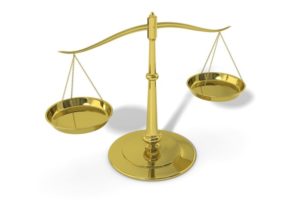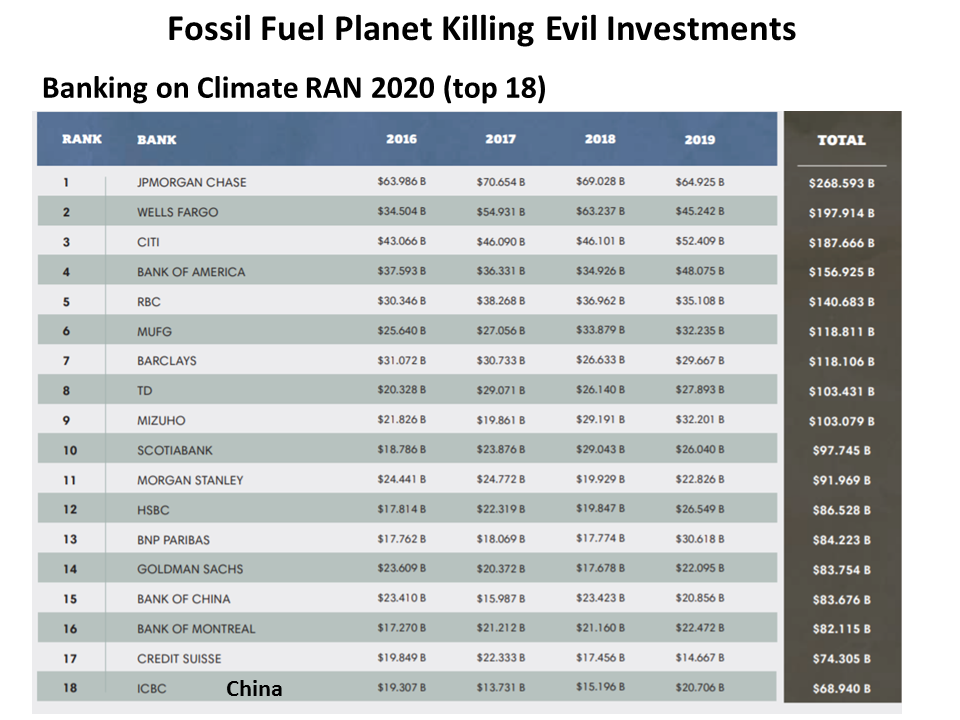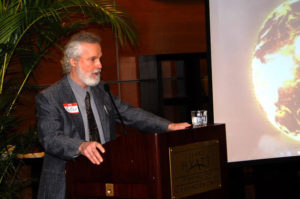
Lack of Ethics is the Prime Disorder
by Dr. Peter Carter
We live in a world of our making. A world of impending planetary catastrophe, a world in the midst of the 6th mass extinction of life. A world being heated up and burned down, with sky rocketing atmospheric levels of climate-disrupting carbon and ocean-poisoning CO2 acidification. A world of conflict, constantly at war, mainly over oil. In a world of plentiful food, world hunger is on the rise again. In regions of climate change impact and conflict, 820 million people do not have enough to eat. For the first time in human history, our future as a species is in doubt.
Ethics is the prime disorder and so it should be our prime issue in attempting to rescue the future. I believe we should prioritize ethics as the climate solution, incorporating as priorities within ethics the rights of future generations, and ecological rights of Nature.
People do understand ethics, though to most, economics — the greatest confidence trick — is a mystery.
Small children know what fairness means. There is nothing complicated about ethics. The Golden Rule has ancient origins. Just one short sentence, it is packed with civilization-sustaining wisdom: “Do unto others as you would have them do unto you.” Searching for a universal modern human ethic, Albert Schweitzer defined ethics as simply deep respect for all life: “Ethics is nothing other than Reverence for Life. Reverence for Life affords me my fundamental principle of morality, namely, that good consists in maintaining, assisting and enhancing life, and to destroy, to harm or to hinder life is evil.”
For most of our time as a species on this planet, Respect for Mother Earth (Mother Nature) and all life has been the simple, self-evident fundamental ethic, which Indigenous people worldwide have relied on to live sustainably for thousands of years. By this universal ethic of All Life, trees are standing people.

Today’s greed-driven, profit-focused, credit (usury)-based economics hinges solely on money. Our economy has done away with ethics, twisting the deadly sins into deadly virtues. It is explicitly based on individual material self-interest that leads to individual power (over) — although this is not human nature, which it perverts. It is an evil economics of doom and destruction.
In 1996, Richard Leakey wrote (with Roger Lewin) The Sixth Extinction: Patterns of Life and the Future of Humankind. “Homo sapiens might not only be the agent of the sixth extinction, but also risks being one of its victims.”
Life and a future are being wiped out before our eyes, which ethically is the greatest evil barely imaginable. Perhaps that is why this annihilation is not being recognized as evil. The enormous energy power of fossil fuels has become the tool of economics, and has driven the obsessive oppressive lust for limitless national and individual power.
Though I cannot find a specific “ethical economics,” we do have better ideas and plans.
- Cambridge Economics Professor Sir Partha Dasgupta, a leading academic example:
“In the quantitative models that appear in leading economics journals and textbooks, nature is taken to be a fixed, indestructible factor of production. The problem with the assumption is that it is wrong: nature consists of degradable resources.”
- The classic Man and Nature: Physical Geography as Modified by Human Action, by George Perkins Marsh in the 1800s:
“Man has too long forgotten that the earth was given to him for usufruct alone, not for consumption, still less for profligate waste.”
- David C. Korten, American author and former Harvard Business School professor:
“A handful of corporations and financial institutions command an ever-greater concentration of economic and political power in an assault against markets, democracy, and life. It’s a suicide economy, [which] destroys the very foundations of its own existence. (When Corporations Rule the World, 1995)
“Our defining gift as humans is our power to choose, including our power to choose our collective future. It is a gift that comes with a corresponding moral responsibility to use that power in ways that work to the benefit of all people and the whole of life.” (Agenda for a New Economy: From Phantom Wealth to Real Wealth, 2010)
- Stan Rowe, geo-ecologist, environmentalist, research forester, professor of plant ecology:
“A trusting attachment to the Ecosphere, an aesthetic empathy with surrounding Nature, a feeling of awe for the miracle of the Living Earth and its mysterious harmonies, is humanity’s largely unrecognized heritage.” (“A Manifesto for Earth,” 2004)
- Richard Douthwaite, British ecologist and economist; co-founder of FEASTA (Foundation for the Economics of Sustainability):
The Growth Illusion: How Economic Growth has Enriched the Few, Impoverished the Many and Endangered the Planet, 1992
Today our economics rules civilization irrationally, explicitly denying all human and economic rights to future generations because they are not (yet) living. Economics, pretending to be a science, has usurped the leading position of ethics in civilization; however an ethics for our future must go beyond the rights of humans, to follow the example of the Indigenous peoples.
We have institutions that partner (conspire) to use this irrational perverse economics to exploit, oppress, kill and destroy on a vast scale. They “manage” to subvert all our good ideas and plans. Somehow they must be overcome or radically reformed for our survival.
They are the big investment banking corporations, the extractive industry corporations, and the compliant nation state governments. The banks are consuming our planet. The 35 leading investment banks show financing of more than 2.66 trillion dollars for fossil fuel industries since the 2015 Paris Agreement (attached top 18):

A February 2020 Chase Manhattan research report recorded in great detail the catastrophic destruction of continued climate disruption, but ended up saying there was no alternative to business as usual. The 1992 UN Earth Summit made a bold attempt to reform economics, but the axis of evil prevailed without any real reforms. Through economic globalization, the power of the corporations has increased enormously.
As a medical doctor and life-long student of Mother Nature, one thing I have learned about all life, even on the very smallest individual scale, is that life never gives up on Life. No matter how great the threat or overwhelming the odds to existence, life never surrenders.
There are countless inspiring examples of such great courage, including personal sacrifice, even in the darkest times of human history.
On the 22 of February 1943, a defiant non-violent 21-year-old German student, Sophie Scholl, who was an anti-Hitler activist, made a prophetic final statement before she was sent to the guillotine: “But what does my death matter, if through us thousands of people are awakened and stirred to action?”
Today, 26 March 2020, there is encouraging good news. In a major victory for the Standing Rock Sioux Tribe in the United States, a federal judge struck down permits for the Dakota Access Pipeline, the notorious oil pipeline plan that crosses the Tribe’s ancestral lands.
A federal court found the Trump administration violated the law when it issued permits for the project. Specifically, the Court found that the U.S. Army Corps of Engineers failed to consider the health and environmental impacts to the Tribe in the event of an oil spill. The climate science is certain. If our species is to survive, there must be no more fossil fuel pipelines built, and the transport of oil and gas by the many pipelines that already exist must be phased out. Our only future is the clean, affordable, endless energy non-combustion future. We literally have no future with any fossil fuels. This is where ethics, economics and science join.
Onward the struggle

Dr. Peter Carter (M.D.) is founder of the Climate Emergency Institute and has served as an expert reviewer for the IPCC. He lives in Victoria, British Columbia, Canada, with his wife, Julie Johnston, who edited this post.